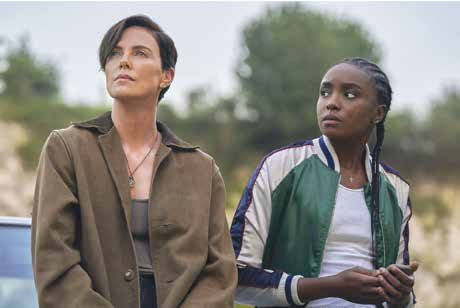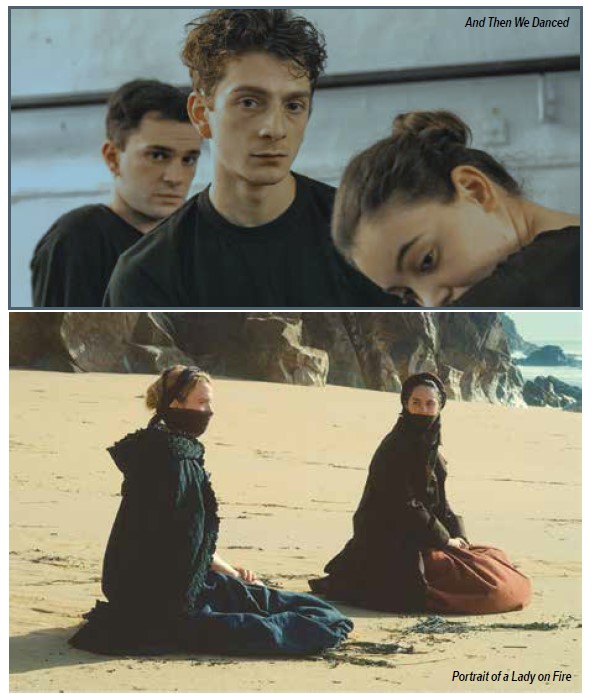
By Gary Kramer–
2020 was unlike any other year for moviegoing as most of it was done at home. But that doesn’t mean there were not great films. Looking back at the year in queer cinema, here are ten highlights—all available for home viewing.
Out gay writer/director Levan Akin’s tender romantic drama And Then We Danced was the first queer feature from Georgia. Merab (Levan Galbakhiani) is a closeted dancer in the Georgian National dance company who falls for Irakli (Bachi Valishvili). They soon initiate a clandestine affair, however, the lovers also become rivals for a position in the main ensemble. How things play out, in both love and dance, form the emotional cores of this compelling film.

Out gay actor Enrique Salanic made an indelible screen debut as the title character in director Li Cheng’s excellent romantic drama José. When gay teenager José has a tryst with Luis (Manolo Herrera), he falls in love, but he worries about leaving his hardworking mother. Salanic gives a remarkable performance, expressing José’s tenderness with Luis—kissing him in bed, or being affectionate during a motorcycle ride—as well as his emotions and longing in reflective scenes of him alone.
Out lesbian director Céline Sciamma’s Portrait of a Lady on Fire was an exquisite, exceptional romantic drama. Set in the 1700s, the film opens with Marianne (Noémie Merlant), who is commissioned to paint Héloïse (Adèle Haenel). This slow-burn drama creates tremendous emotions as it depicts the relationship that develops between these two women.
Out queer writer/director James Sweeney’s Straight Upwas a terrific rom-com with a twist. Todd (Sweeney) drops a bombshell on his friends when he tells them, “I think I’m not gay.” And when he meets Rory (Katie Findlay), a budding actress, they couple up in comfortable domesticity. But can it last? Sweeney infuses his film with poignant moments as well as perceptive insights about love and relationships. In addition, the filmmaker employs inventive visuals that add to the fun.

Another fabulous rom-com this year was The Half of It, by out lesbian filmmaker Alice Wu. Set in a rural high school, this film is as charming as it is thoughtful and heartfelt. When Paul Munsky (Daniel Diemer) hires overachiever Ellie (Leah Lewis) to pen a love letter to Aster (Alexxis Lemire), she reluctantly agrees. However, Ellie is secretly crushed on Aster, and as she gets to know the object of Paul’s affection better, she comes to understand herself more. The Half of It may be steeped in a Cyrano-esque trope for the texting generation, but it shows how Ellie’s friendship with Paul improves both of their lives. It also illustrates how her unlikely connection with Aster sparks a sense of independence for each of the young women.
The Old Guard was a kickass, globetrotting piece of escapism. Adapted from the comic book by Leandro Fernandez and Greg Rucka—the latter penned the film’s screenplay—the story concerns Andromache of Scythia, aka “Andy” (Charlize Theron), and her ruthlessly efficient team of mercenaries, which includes a gay couple: Joe (Marwan Kenzari) and Nicky (Luca Marinelli). Theron swaggers and fights her way through the film with panache. But this entertaining action-fantasy, nimbly directed by Gina Prince-Bythewood, has a moral center. Moreover, there is a lovely speech by Joe when he is teased by a soldier about Nicky, his boyfriend of 900 years.

One of the year’s best documentaries was Disclosure by out trans director Sam Feder. This engaging, affirming film evaluates how transgender characters are presented and consumed by both trans and cisgender viewers. Laverne Cox, Jen Richards, and dozens of other trans actors, filmmakers, and writers, discuss representation on screen. Often trans characters are the butt of jokes, psychopaths, or playing victims and/or sex workers in ratings-grabbing police and medical shows on TV. They were also exploited on talk shows where they were meant to educate audiences. Yet Feder validates the strides being made. Disclosure provides a critical awareness about how we are defined by what we watch.
Likewise, out gay director David France’s Welcome to Chechnya was a devastating documentary that shone a critical light on the antigay purges in Ramzan Kadyrov’s Chechnya. But this film also chronicles the courageous efforts of activists David Isteev and Olga Baranova, who help members of the LGBTQ+ community by finding them safe houses and arranging their escape.
Out gay writer/director Alan Ball’s engaging, poignant drama Uncle Frank has Beth (Sophia Lillis), a teenager chatting with her uncle Frank (Paul Bettany) in 1969 Creeksville, SC. Four years later, she becomes a freshman at NYU, where Frank teaches, and learns that Frank is gay. When his father dies, Frank and Beth take a road trip to the funeral, prompting Frank to perhaps come out to his family and grapple with some serious emotional demons. The film is elevated by Bettany’s strong performance that shifts from inspiring uncle to anxious and scared son.
Lastly, Aviva was writer/director Boaz Yakin’s wildly original dance drama. The film’s bold, gender-bending conceit is that the lovers, Aviva and Eden, are each played by both a man and woman. As such, over the course of the story, all four actors end up in same-sex situations. The dancing is sensational, and the gorgeous performers all look good naked.
Happy Viewing and Happy New Year!
© 2021 Gary M. Kramer
Gary M. Kramer is the author of “Independent Queer Cinema: Reviews and Interviews,” and the co-editor of “Directory of World Cinema: Argentina.” Follow him on Twitter @garymkramer
Published on December 17, 2020
Recent Comments